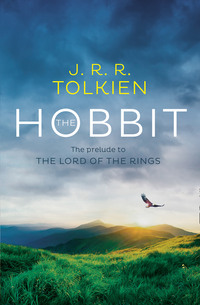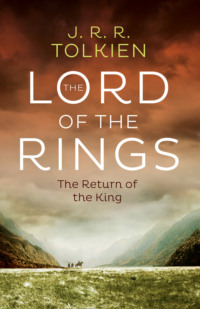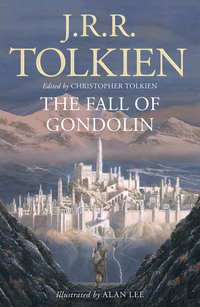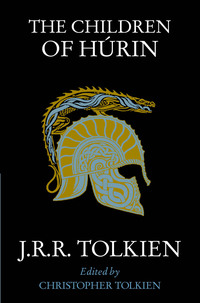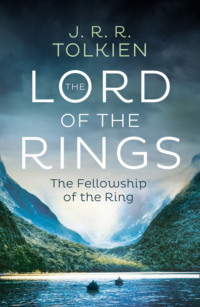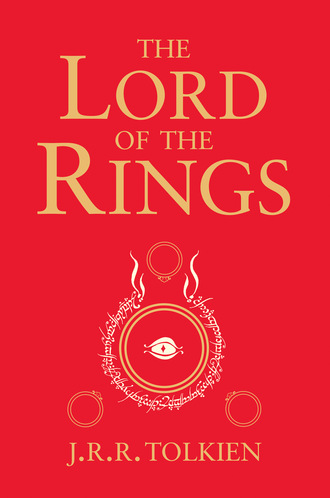
Полная версия
‘Of course, I have sometimes thought of going away, but I imagined that as a kind of holiday, a series of adventures like Bilbo’s or better, ending in peace. But this would mean exile, a flight from danger into danger, drawing it after me. And I suppose I must go alone, if I am to do that and save the Shire. But I feel very small, and very uprooted, and well – desperate. The Enemy is so strong and terrible.’
He did not tell Gandalf, but as he was speaking a great desire to follow Bilbo flamed up in his heart – to follow Bilbo, and even perhaps to find him again. It was so strong that it overcame his fear: he could almost have run out there and then down the road without his hat, as Bilbo had done on a similar morning long ago.
‘My dear Frodo!’ exclaimed Gandalf. ‘Hobbits really are amazing creatures, as I have said before. You can learn all that there is to know about their ways in a month, and yet after a hundred years they can still surprise you at a pinch. I hardly expected to get such an answer, not even from you. But Bilbo made no mistake in choosing his heir, though he little thought how important it would prove. I am afraid you are right. The Ring will not be able to stay hidden in the Shire much longer; and for your own sake, as well as for others, you will have to go, and leave the name of Baggins behind you. That name will not be safe to have, outside the Shire or in the Wild. I will give you a travelling name now. When you go, go as Mr. Underhill.
‘But I don’t think you need go alone. Not if you know of anyone you can trust, and who would be willing to go by your side – and that you would be willing to take into unknown perils. But if you look for a companion, be careful in choosing! And be careful of what you say, even to your closest friends! The enemy has many spies and many ways of hearing.’
Suddenly he stopped as if listening. Frodo became aware that all was very quiet, inside and outside. Gandalf crept to one side of the window. Then with a dart he sprang to the sill, and thrust a long arm out and downwards. There was a squawk, and up came Sam Gamgee’s curly head hauled by one ear.
‘Well, well, bless my beard!’ said Gandalf. ‘Sam Gamgee is it? Now what may you be doing?’
‘Lor bless you, Mr. Gandalf, sir!’ said Sam. ‘Nothing! Leastways I was just trimming the grass-border under the window, if you follow me.’ He picked up his shears and exhibited them as evidence.
‘I don’t,’ said Gandalf grimly. ‘It is some time since I last heard the sound of your shears. How long have you been eavesdropping?’
‘Eavesdropping, sir? I don’t follow you, begging your pardon. There ain’t no eaves at Bag End, and that’s a fact.’
‘Don’t be a fool! What have you heard, and why did you listen?’ Gandalf’s eyes flashed and his brows stuck out like bristles.
‘Mr. Frodo, sir!’ cried Sam quaking. ‘Don’t let him hurt me, sir! Don’t let him turn me into anything unnatural! My old dad would take on so. I meant no harm, on my honour, sir!’
‘He won’t hurt you,’ said Frodo, hardly able to keep from laughing, although he was himself startled and rather puzzled. ‘He knows, as well as I do, that you mean no harm. But just you up and answer his questions straight away!’
‘Well, sir,’ said Sam dithering a little. ‘I heard a deal that I didn’t rightly understand, about an enemy, and rings, and Mr. Bilbo, sir, and dragons, and a fiery mountain, and – and Elves, sir. I listened because I couldn’t help myself, if you know what I mean. Lor bless me, sir, but I do love tales of that sort. And I believe them too, whatever Ted may say. Elves, sir! I would dearly love to see them. Couldn’t you take me to see Elves, sir, when you go?’
Suddenly Gandalf laughed. ‘Come inside!’ he shouted, and putting out both his arms he lifted the astonished Sam, shears, grass-clippings and all, right through the window and stood him on the floor. ‘Take you to see Elves, eh?’ he said, eyeing Sam closely, but with a smile flickering on his face. ‘So you heard that Mr. Frodo is going away?’
‘I did, sir. And that’s why I choked: which you heard seemingly. I tried not to, sir, but it burst out of me: I was so upset.’
‘It can’t be helped, Sam,’ said Frodo sadly. He had suddenly realized that flying from the Shire would mean more painful partings than merely saying farewell to the familiar comforts of Bag End. ‘I shall have to go. But’ – and here he looked hard at Sam – ‘if you really care about me, you will keep that dead secret. See? If you don’t, if you even breathe a word of what you’ve heard here, then I hope Gandalf will turn you into a spotted toad and fill the garden full of grass-snakes.’
Sam fell on his knees, trembling. ‘Get up, Sam!’ said Gandalf. ‘I have thought of something better than that. Something to shut your mouth, and punish you properly for listening. You shall go away with Mr. Frodo!’
‘Me, sir!’ cried Sam, springing up like a dog invited for a walk. ‘Me go and see Elves and all! Hooray!’ he shouted, and then burst into tears.
Chapter 3
THREE IS COMPANY
‘You ought to go quietly, and you ought to go soon,’ said Gandalf. Two or three weeks had passed, and still Frodo made no sign of getting ready to go.
‘I know. But it is difficult to do both,’ he objected. ‘If I just vanish like Bilbo, the tale will be all over the Shire in no time.’
‘Of course you mustn’t vanish!’ said Gandalf. ‘That wouldn’t do at all! I said soon, not instantly. If you can think of any way of slipping out of the Shire without its being generally known, it will be worth a little delay. But you must not delay too long.’
‘What about the autumn, on or after Our Birthday?’ asked Frodo. ‘I think I could probably make some arrangements by then.’
To tell the truth, he was very reluctant to start, now that it had come to the point: Bag End seemed a more desirable residence than it had for years, and he wanted to savour as much as he could of his last summer in the Shire. When autumn came, he knew that part at least of his heart would think more kindly of journeying, as it always did at that season. He had indeed privately made up his mind to leave on his fiftieth birthday: Bilbo’s one hundred and twenty-eighth. It seemed somehow the proper day on which to set out and follow him. Following Bilbo was uppermost in his mind, and the one thing that made the thought of leaving bearable. He thought as little as possible about the Ring, and where it might lead him in the end. But he did not tell all his thoughts to Gandalf. What the wizard guessed was always difficult to tell.
He looked at Frodo and smiled. ‘Very well,’ he said. ‘I think that will do – but it must not be any later. I am getting very anxious. In the meanwhile, do take care, and don’t let out any hint of where you are going! And see that Sam Gamgee does not talk. If he does, I really shall turn him into a toad.’
‘As for where I am going,’ said Frodo, ‘it would be difficult to give that away, for I have no clear idea myself, yet.’
‘Don’t be absurd!’ said Gandalf. ‘I am not warning you against leaving an address at the post-office! But you are leaving the Shire – and that should not be known, until you are far away. And you must go, or at least set out, either North, South, West or East – and the direction should certainly not be known.’
‘I have been so taken up with the thoughts of leaving Bag End, and of saying farewell, that I have never even considered the direction,’ said Frodo. ‘For where am I to go? And by what shall I steer? What is to be my quest? Bilbo went to find a treasure, there and back again; but I go to lose one, and not return, as far as I can see.’
‘But you cannot see very far,’ said Gandalf. ‘Neither can I. It may be your task to find the Cracks of Doom; but that quest may be for others: I do not know. At any rate you are not ready for that long road yet.’
‘No indeed!’ said Frodo. ‘But in the meantime what course am I to take?’
‘Towards danger; but not too rashly, nor too straight,’ answered the wizard. ‘If you want my advice, make for Rivendell. That journey should not prove too perilous, though the Road is less easy than it was, and it will grow worse as the year fails.’
‘Rivendell!’ said Frodo. ‘Very good: I will go east, and I will make for Rivendell. I will take Sam to visit the Elves; he will be delighted.’ He spoke lightly; but his heart was moved suddenly with a desire to see the house of Elrond Halfelven, and breathe the air of that deep valley where many of the Fair Folk still dwelt in peace.
One summer’s evening an astonishing piece of news reached the Ivy Bush and Green Dragon. Giants and other portents on the borders of the Shire were forgotten for more important matters: Mr. Frodo was selling Bag End, indeed he had already sold it – to the Sackville-Bagginses!
‘For a nice bit, too,’ said some. ‘At a bargain price,’ said others, ‘and that’s more likely when Mistress Lobelia’s the buyer.’(Otho had died some years before, at the ripe but disappointed age of 102.)
Just why Mr. Frodo was selling his beautiful hole was even more debatable than the price. A few held the theory – supported by the nods and hints of Mr. Baggins himself – that Frodo’s money was running out: he was going to leave Hobbiton and live in a quiet way on the proceeds of the sale down in Buckland among his Brandybuck relations. ‘As far from the Sackville-Bagginses as may be,’ some added. But so firmly fixed had the notion of the immeasurable wealth of the Bagginses of Bag End become that most found this hard to believe, harder than any other reason or unreason that their fancy could suggest: to most it suggested a dark and yet unrevealed plot by Gandalf. Though he kept himself very quiet and did not go about by day, it was well known that he was ‘hiding up in the Bag End’. But however a removal might fit in with the designs of his wizardry, there was no doubt about the fact: Frodo Baggins was going back to Buckland.
‘Yes, I shall be moving this autumn,’ he said. ‘Merry Brandybuck is looking out for a nice little hole for me, or perhaps a small house.’
As a matter of fact with Merry’s help he had already chosen and bought a little house at Crickhollow in the country beyond Bucklebury. To all but Sam he pretended he was going to settle down there permanently. The decision to set out eastwards had suggested the idea to him; for Buckland was on the eastern borders of the Shire, and as he had lived there in childhood his going back would at least seem credible.
Gandalf stayed in the Shire for over two months. Then one evening, at the end of June, soon after Frodo’s plan had been finally arranged, he suddenly announced that he was going off again next morning. ‘Only for a short while, I hope,’ he said. ‘But I am going down beyond the southern borders to get some news, if I can. I have been idle longer than I should.’
He spoke lightly, but it seemed to Frodo that he looked rather worried. ‘Has anything happened?’ he asked.
‘Well no; but I have heard something that has made me anxious and needs looking into. If I think it necessary after all for you to get off at once, I shall come back immediately, or at least send word. In the meanwhile stick to your plan; but be more careful than ever, especially of the Ring. Let me impress on you once more: don’t use it!’
He went off at dawn. ‘I may be back any day,’ he said. ‘At the very latest I shall come back for the farewell party. I think after all you may need my company on the Road.’
At first Frodo was a good deal disturbed, and wondered often what Gandalf could have heard; but his uneasiness wore off, and in the fine weather he forgot his troubles for a while. The Shire had seldom seen so fair a summer, or so rich an autumn: the trees were laden with apples, honey was dripping in the combs, and the corn was tall and full.
Autumn was well under way before Frodo began to worry about Gandalf again. September was passing and there was still no news of him. The Birthday, and the removal, drew nearer, and still he did not come, or send word. Bag End began to be busy. Some of Frodo’s friends came to stay and help him with the packing: there was Fredegar Bolger and Folco Boffin, and of course his special friends Pippin Took and Merry Brandybuck. Between them they turned the whole place upside-down.
On September 20th two covered carts went off laden to Buckland, conveying the furniture and goods that Frodo had not sold to his new home, by way of the Brandywine Bridge. The next day Frodo became really anxious, and kept a constant look-out for Gandalf. Thursday, his birthday morning, dawned as fair and clear as it had long ago for Bilbo’s great party. Still Gandalf did not appear. In the evening Frodo gave his farewell feast: it was quite small, just a dinner for himself and his four helpers; but he was troubled and felt in no mood for it. The thought that he would so soon have to part with his young friends weighed on his heart. He wondered how he would break it to them.
The four younger hobbits were, however, in high spirits, and the party soon became very cheerful in spite of Gandalf’s absence. The dining-room was bare except for a table and chairs, but the food was good, and there was good wine: Frodo’s wine had not been included in the sale to the Sackville-Bagginses.
‘Whatever happens to the rest of my stuff, when the S.-B.s get their claws on it, at any rate I have found a good home for this!’ said Frodo, as he drained his glass. It was the last drop of Old Winyards.
When they had sung many songs, and talked of many things they had done together, they toasted Bilbo’s birthday, and they drank his health and Frodo’s together according to Frodo’s custom. Then they went out for a sniff of air, and glimpse of the stars, and then they went to bed. Frodo’s party was over, and Gandalf had not come.
The next morning they were busy packing another cart with the remainder of the luggage. Merry took charge of this, and drove off with Fatty (that is Fredegar Bolger). ‘Someone must get there and warm the house before you arrive,’ said Merry. ‘Well, see you later – the day after tomorrow, if you don’t go to sleep on the way!’
Folco went home after lunch, but Pippin remained behind. Frodo was restless and anxious, listening in vain for a sound of Gandalf. He decided to wait until nightfall. After that, if Gandalf wanted him urgently, he would go to Crickhollow, and might even get there first. For Frodo was going on foot. His plan – for pleasure and a last look at the Shire as much as any other reason – was to walk from Hobbiton to Bucklebury Ferry, taking it fairly easy.
‘I shall get myself a bit into training, too,’ he said, looking at himself in a dusty mirror in the half-empty hall. He had not done any strenuous walking for a long time, and the reflection looked rather flabby, he thought.
After lunch, the Sackville-Bagginses, Lobelia and her sandy-haired son, Lotho, turned up, much to Frodo’s annoyance. ‘Ours at last!’ said Lobelia, as she stepped inside. It was not polite; nor strictly true, for the sale of Bag End did not take effect until midnight. But Lobelia can perhaps be forgiven: she had been obliged to wait about seventy-seven years longer for Bag End than she once hoped, and she was now a hundred years old. Anyway, she had come to see that nothing she had paid for had been carried off; and she wanted the keys. It took a long while to satisfy her, as she had brought a complete inventory with her and went right through it. In the end she departed with Lotho and the spare key and the promise that the other key would be left at the Gamgees’ in Bagshot Row. She snorted, and showed plainly that she thought the Gamgees capable of plundering the hole during the night. Frodo did not offer her any tea.
He took his own tea with Pippin and Sam Gamgee in the kitchen. It had been officially announced that Sam was coming to Buckland ‘to do for Mr. Frodo and look after his bit of garden’; an arrangement that was approved by the Gaffer, though it did not console him for the prospect of having Lobelia as a neighbour.
‘Our last meal at Bag End!’ said Frodo, pushing back his chair. They left the washing up for Lobelia. Pippin and Sam strapped up their three packs and piled them in the porch. Pippin went out for a last stroll in the garden. Sam disappeared.
The sun went down. Bag End seemed sad and gloomy and dishevelled. Frodo wandered round the familiar rooms, and saw the light of the sunset fade on the walls, and shadows creep out of the corners. It grew slowly dark indoors. He went out and walked down to the gate at the bottom of the path, and then on a short way down the Hill Road. He half expected to see Gandalf come striding up through the dusk.
The sky was clear and the stars were growing bright. ‘It’s going to be a fine night,’ he said aloud. ‘That’s good for a beginning. I feel like walking. I can’t bear any more hanging about. I am going to start, and Gandalf must follow me.’ He turned to go back, and then stopped, for he heard voices, just round the corner by the end of Bagshot Row. One voice was certainly the old Gaffer’s; the other was strange, and somehow unpleasant. He could not make out what it said, but he heard the Gaffer’s answers, which were rather shrill. The old man seemed put out.
‘No, Mr. Baggins has gone away. Went this morning, and my Sam went with him: anyway all his stuff went. Yes, sold out and gone, I tell’ee. Why? Why’s none of my business, or yours. Where to? That ain’t no secret. He’s moved to Bucklebury or some such place, away down yonder. Yes it is – a tidy way. I’ve never been so far myself; they’re queer folks in Buckland. No, I can’t give no message. Good night to you!’
Footsteps went away down the Hill. Frodo wondered vaguely why the fact that they did not come on up the Hill seemed a great relief. ‘I am sick of questions and curiosity about my doings, I suppose,’ he thought. ‘What an inquisitive lot they all are!’ He had half a mind to go and ask the Gaffer who the inquirer was; but he thought better (or worse) of it, and turned and walked quickly back to Bag End.
Pippin was sitting on his pack in the porch. Sam was not there. Frodo stepped inside the dark door. ‘Sam!’ he called. ‘Sam! Time!’
‘Coming, sir!’ came the answer from far within, followed soon by Sam himself, wiping his mouth. He had been saying farewell to the beer-barrel in the cellar.
‘All aboard, Sam?’ said Frodo.
‘Yes, sir. I’ll last for a bit now, sir.’
Frodo shut and locked the round door, and gave the key to Sam. ‘Run down with this to your home, Sam!’ he said. ‘Then cut along the Row and meet us as quick as you can at the gate in the lane beyond the meadows. We are not going through the village tonight. Too many ears pricking and eyes prying.’ Sam ran off at full speed.
‘Well, now we’re off at last!’ said Frodo. They shouldered their packs and took up their sticks, and walked round the corner to the west side of Bag End. ‘Good-bye!’ said Frodo, looking at the dark blank windows. He waved his hand, and then turned and (following Bilbo, if he had known it) hurried after Peregrin down the garden-path. They jumped over the low place in the hedge at the bottom and took to the fields, passing into the darkness like a rustle in the grasses.
At the bottom of the Hill on its western side they came to the gate opening on to a narrow lane. There they halted and adjusted the straps of their packs. Presently Sam appeared, trotting quickly and breathing hard; his heavy pack was hoisted high on his shoulders, and he had put on his head a tall shapeless felt bag, which he called a hat. In the gloom he looked very much like a dwarf.
‘I am sure you have given me all the heaviest stuff,’ said Frodo. ‘I pity snails, and all that carry their homes on their backs.’
‘I could take a lot more yet, sir. My packet is quite light,’ said Sam stoutly and untruthfully.
‘No you don’t, Sam!’ said Pippin. ‘It is good for him. He’s got nothing except what he ordered us to pack. He’s been slack lately, and he’ll feel the weight less when he’s walked off some of his own.’
‘Be kind to a poor old hobbit!’ laughed Frodo. ‘I shall be as thin as a willow-wand, I’m sure, before I get to Buckland. But I was talking nonsense. I suspect you have taken more than your share, Sam, and I shall look into it at our next packing.’ He picked up his stick again. ‘Well, we all like walking in the dark,’ he said, ‘so let’s put some miles behind us before bed.’
For a short way they followed the lane westwards. Then leaving it they turned left and took quietly to the fields again. They went in single file along hedgerows and the borders of coppices, and night fell dark about them. In their dark cloaks they were as invisible as if they all had magic rings. Since they were all hobbits, and were trying to be silent, they made no noise that even hobbits would hear. Even the wild things in the fields and woods hardly noticed their passing.
After some time they crossed the Water, west of Hobbiton, by a narrow plank-bridge. The stream was there no more than a winding black ribbon, bordered with leaning alder-trees. A mile or two further south they hastily crossed the great road from the Brandywine Bridge; they were now in the Tookland and bending south-eastwards they made for the Green Hill Country. As they began to climb its first slopes they looked back and saw the lamps in Hobbiton far off twinkling in the gentle valley of the Water. Soon it disappeared in the folds of the darkened land, and was followed by Bywater beside its grey pool. When the light of the last farm was far behind, peeping among the trees, Frodo turned and waved a hand in farewell.
‘I wonder if I shall ever look down into that valley again,’ he said quietly.
When they had walked for about three hours they rested. The night was clear, cool, and starry, but smoke-like wisps of mist were creeping up the hill-sides from the streams and deep meadows. Thin-clad birches, swaying in a light wind above their heads, made a black net against the pale sky. They ate a very frugal supper (for hobbits), and then went on again. Soon they struck a narrow road, that went rolling up and down, fading grey into the darkness ahead: the road to Woodhall, and Stock, and the Bucklebury Ferry. It climbed away from the main road in the Water-valley, and wound over the skirts of the Green Hills towards Woody End, a wild corner of the Eastfarthing.
After a while they plunged into a deeply cloven track between tall trees that rustled their dry leaves in the night. It was very dark. At first they talked, or hummed a tune softly together, being now far away from inquisitive ears. Then they marched on in silence, and Pippin began to lag behind. At last, as they began to climb a steep slope, he stopped and yawned.
‘I am so sleepy,’ he said, ‘that soon I shall fall down on the road. Are you going to sleep on your legs? It is nearly midnight.’
‘I thought you liked walking in the dark,’ said Frodo. ‘But there is no great hurry. Merry expects us some time the day after tomorrow; but that leaves us nearly two days more. We’ll halt at the first likely spot.’
‘The wind’s in the West,’ said Sam. ‘If we get to the other side of this hill, we shall find a spot that is sheltered and snug enough, sir. There is a dry fir-wood just ahead, if I remember rightly.’ Sam knew the land well within twenty miles of Hobbiton, but that was the limit of his geography.
Just over the top of the hill they came on the patch of fir-wood. Leaving the road they went into the deep resin-scented darkness of the trees, and gathered dead sticks and cones to make a fire. Soon they had a merry crackle of flame at the foot of a large fir-tree and they sat round it for a while, until they began to nod. Then, each in an angle of the great tree’s roots, they curled up in their cloaks and blankets, and were soon fast asleep. They set no watch; even Frodo feared no danger yet, for they were still in the heart of the Shire. A few creatures came and looked at them when the fire had died away. A fox passing through the wood on business of his own stopped several minutes and sniffed.



